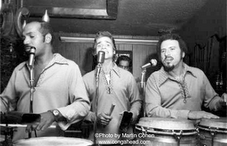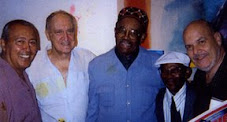
At the beginning of the last century, many Anglicans left New England bound for
Hawaii, the islands of the Pacific, and
China. They were
missionaries trained in medicine who were seeking to save souls by distributing Bibles and healing the sick. Often among hostile populations, they were not always welcomed. Like the early Jesuits who spread out in Southeast Asia and
Japan, they were hoping for converts. In
Honolulu, someone told me, “We exchanged our land for their Bibles.”
Ever since a santero, Juan Besson, told me that I would “carry this music around the world,” I have distributed cassettes instead of Bibles to everyone who would listen to my message. I even left them in hotel rooms, like the Gideon Society leaves the New Testament. The message, or as it is called, the “good news,” that I preach through Latin music is something that goes like this: “God love music.” If God is love then music is love in its most harmonious form. Where harmony is absent, love is absent. St. Paul, the fisher of men, sent Epistles all around the Mediterranean world, obeying the command of a higher power. When you hear Latin music, it is like a command to rise up and dance. For me, the music turned me into a professional dancer. But it was the command of the santero that was a religious experience that turned me into a “musical missionary.”
There is a Cuban song that says, por vivir en quinto patio / desprecias mis besos. Basically, “You disrespect me because I am poor.” Referring to the eighteen-hour documentary called Jazz, it is obvious to the thirty million Latinos in the USA that they are not only ignored by are used to benefit jazz. Latinos have been (ever since Mario Bauzá composed “Tanga,” a piece rarely heard and one that jazz influenced to its detriment) “Los Amigos Invisibles” of the jazzistas. Things are changing it seems and the complacent invisible friends are emerging from the shadow that jazz cast upon them unjustifiably. The January 28 issue of Variety says that “The Business Now Loves the Latins.” Jennifer Lopez just beat out the number one Beatles and she, like Ricky Martin, is not a true Latina. Another tune called “Cuando Llegará” can be answered now: “Ya Llegó.”
To close this sermon, let me quote from Luis Pales-Matos: “Ahi vienen los tambores! Ten Cuidado hombre blanco, que a ti llegan para clavarte su aguijón de música…te picará un tambor de danz o Guerra.”
“El son es lo mas sublime para el alma divertir quien pro bueno no lo estime, debe de morir.”
 At the beginning of the last century, many Anglicans left New England bound for
At the beginning of the last century, many Anglicans left New England bound for 

No comments:
Post a Comment